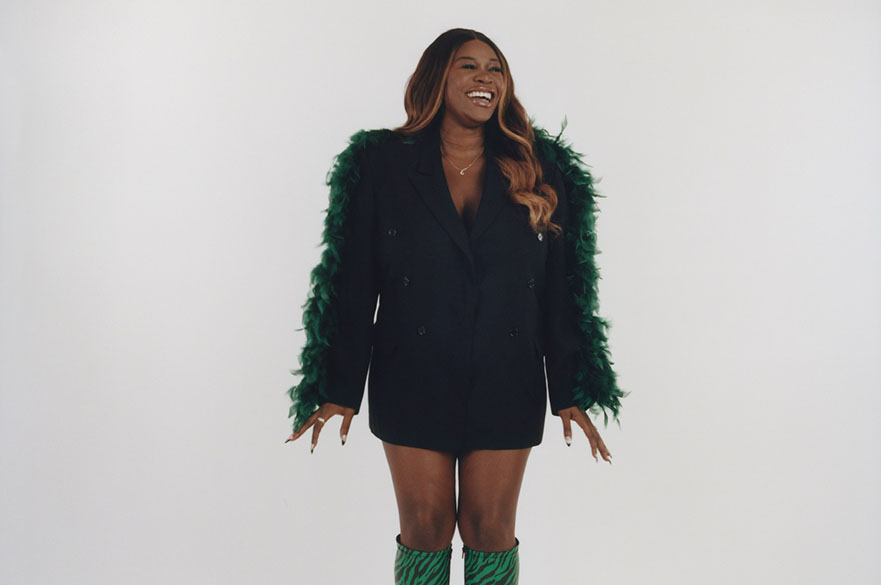The NTU alum challenging attitudes towards women’s appearance and promoting body confidence
Journalist and presenter Jackie Adedeji talks about her recent documentary on Channel 4.
By John Anderson | Published on 7 July 2023
Categories: Alumni;

My Big Boobs explores the lives of women with naturally big breasts and how they are viewed by wider society.
Having studied BA (Hons) Broadcast Journalism at NTU back in 2015, Jackie is a professional journalist and presenter. She knows how to pitch a story, but this one is particularly personal.
Her passion for journalism began at NTU. “I came to a Centre for Broadcasting and Journalism open day,” Jackie says, “and I thought – this is the place – I need to come here! I learned such a lot and it gave me the skills and tenacity you need in this business.”
That tenacity came in handy.
“I pitched my idea – which would finally appear on Channel 4 – to loads of production companies,” Jackie says, “and they all turned me down. It took six to seven months to get the official sign-off, but when we finally did, it felt really good.”
It’s probably now time to address the elephant in the living room.
Attitudes to subjects like this have thankfully matured in recent years. But it’s not so long ago that discussions about women’s 'figures' or 'physiques' might have been met with sniggers – and in some cases, misogynistic derision.
Jackie is all too aware.
“It was such a relief to be able to tell this story from a personal perspective. It was important because traditionally, when ‘big boobs’ are talked about in the context of the British media, it's often quite comical, super sensationalist or, you know, even salacious.”
Jackie hopes the Channel 4 documentary and her work promoting positive body image will help change attitudes. But there’s still work to be done.

“I know that from my own recent experiences,” she says. “I bumped into someone I used to work for yesterday and was telling him about the documentary. And he's like, oh, what's it about? And I said, ‘big boobs!’ and he just started laughing. And I said, what's funny? He admitted he didn’t know. He reckons it just made him laugh.
“This, for me, is the driving force. Let's have a real conversation about the attitudes towards women’s appearance and how it affects them – not just physically, but psychologically.
“Sadly, for a lot of women, their attitude is – I didn't ask for this. I was born like it. But then on the other side, you have people who think – wow – you're so lucky.
“I want to change attitudes and – in the documentary – tried to motivate the viewing audience to question their own.”
Jackie is also keen to educate people to the other practical, day-to-day challenges the issue brings.
“For lots of women like me, it’s not just the psychological warfare you go through every day, but very basic things like trying to find something stylish – dare I say comfortable – to wear, without having to navigate through all these weird attitudes and worrying about ‘showing your figure off’, drawing attention, or ‘failing to keep your head down’. Then there are the cost implications of finding clothing. You’d be amazed how difficult it is to find reasonably priced bras – and you can rarely just walk into a shop because chances are, they don't have your size.”
Jackie’s investigation also looks at the growing number of women choosing to have breast reduction surgery.
“That’s another battle entirely,” Jackie says. “I’ve seen women having to start crowd-funding campaigns to be able to afford the procedure.
“Breast reduction is free on the NHS, but it depends on where you're based as local hospital and surgery budgets vary. Some women are able to get a breast reduction for free with few problems. Others have to wait five years or are repeatedly turned away.
“Then there’s the criteria involved in qualifying for surgery, like how big your boobs have to be, or how bad you have to be suffering in terms of other symptoms.”
Jackie is determined to continue her work championing the positive body image for women. And when you stop to consider the evidence, there is nothing remotely salacious, comical or sensationalist about addressing the way we talk about an individual’s body.
“Ultimately, I want women to be able to be free and who they are in their bodies. We all need to show extra compassion and wake up to the fact that we’re talking about women, and not just objects.”
Reconnect with NTU
With more than a quarter of a million members, the NTU alumni community reaches around the world and into every industry you can imagine. Whether you’re looking to reconnect with old friends, give something back, or want to take advantage of our range of alumni benefits, we’re still here for you.
Visit this page to reconnect with us.